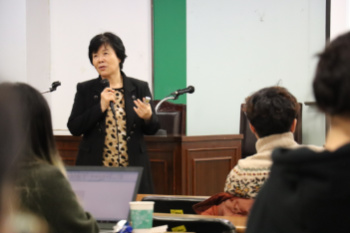
Starting from Nov. 8, the Philosophy Concert series “We think about North Korea’s philosophy, Women, and Unification” was held for three weeks on Thursdays with Doctor Hyun In-ae as the lecturer.
The purpose of this talk concert was to discuss the developing issues related to the improvement of interKorean relationships. Professor Lee Ji-aeh, the director of the Institute of Philosophy, introduced Doctor Hyun as a member of the Ewha community and an expert who would point out easily overlooked issues about North Korea.
Doctor Hyun In-ae graduated from Kim Il Sung University, a prestigious university in North Korea, as a philosophy major. After her husband was confined as a political prisoner, she escaped the North in 2004 and came to South Korea following her children, who had escaped before her. She studied at Ewha Graduate School, received a doctoral degree for North Korean Studies in 2014, and is now a visiting professor at Ewha.
As a person who has firsthand experiences of the situation in the North, she shared her stories at the talk concert, not only with Ewha students, but anyone who was interested, including professors and the elderly. For the first lecture of the series, Doctor Hyun introduced the Juche ideology of North Korea, which forms the basis of the country’s ideological system.
“People living in the North is obligated to learn the Juche ideology since very young and this makes it possible for the government to rule the country and control its people,” Doctor Hyun explained. “Some may ask whether the people are vacuous for not being able to judge what is right or wrong, but this early education system and dictatorship built firmly in the society makes it impossible for them to do so. The isolation from the rest of the world makes it impossible for them to think in a different way.”
She also said that she too was educated under a strict system without much freedom or rights. Though she went to the best university of the country, she was educated like a solider, as schools are a part of the military.
“At the university, we wore uniforms and had classmates just like high school,” she said. “I was never asked about my interests or wants and instead was assigned to study for a philosophy major when I entered university, since an individual’s opinions are not considered to be important in North Korea.”
After discussing the ideology and the education system of North Korea, she concluded the lecture by sharing her concerns about the unification of North Korea and South Korea.
"Among the problems we face for improvement regarding relationships and unification, the philosophical gap between the two Koreas seems to be the biggest obstacle,” she said. “Many things are banned in the North, and people do not have a chance to experience new things that understanding the philosophy of other countries, which are distinct from what they know, will be difficult. Therefore, the people living in the two countries should be given more chances to meet and experience new cultures to narrow the gap, especially by having more chances to meet one to one with others. However, it will be difficult due to the North Korean government’s reluctance for such cultural exchanges. This really is a big barrier that we should remove in order to improve interKorean relationships and discuss unification.”
Following the lecture on the philosophy of North Korea, lectures on women and unification were held, respectively, on Nov. 15 and Nov. 22. For the following two days, Professor Kim Seok-hyang from North Korean Studies and the school club Eokkaedongmu participated in panels to discuss the topic in depth.

